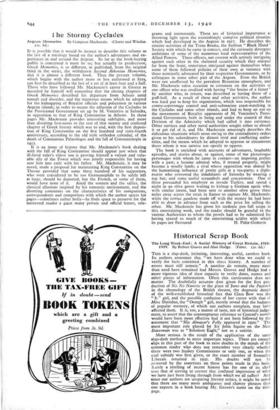the Stormy Cyclades
IT is possible that it would be inexact to describe this volume as the last of a tetralogy based on the author's adventures and ex- periences in and around the Aegean. So far as the book-buying public is concerned it must be so; but actually its predecessor, Greek Memories, is so different, as published, from the original third in the series, the withdrawn Second Athenian Memories, that it is almost a different book. Thus the present volume, which begins with the author more or less enthroned at Syra, can best be described as the last of a set of at least four and a half. Those who have followed Mr. Mackenzie's career in Greece as recorded by himself will remember that the closing chapters of Greek Memories described his departure from Athens amid tumult and disorder, and the ingenious means which he adopted for the kidnapping of Royalist officials and policemen in various Aegean islands, in order to secure the adhesion of the Cyclades to the Provisional Government set up by M. Venizelos at Salonika, in opposition to that of King Constantine in Athens. In these pages Mr. Mackenzie provides interesting sidelights, and more than diverting foot-notes to the rest of that stormy and confused chapter of Greek history which was to end, with the first deposi- tion of King Constantine on the five hundred and sixty-fourth anniversary, according to the old style orthodox calendar, of the death of Constantine Palaeologos and the fall of Constantinople in 1453.
It is an irony of history that Mr. Mackenzie's book dealing with the fall of King Constantine should appear just when that ill-fated ruler's eldest son is proving himself a valiant .and valu- able ally of the Power which was jointly responsible for having sent him into exile with his father. Mr. Mackenzie, it may be noted, made a proposal for maintaining King Constantine on the Throne provided that some three hundred of his supporters, who were considered to be too Germanophile to be safely left at large, should be deported, but the French, or some of them, would have none of it. Amid the sonnets and the sallies, the classical allusions inspired by his romantic environment, and the diverting comments on the characteristics of his companions, correspondents and competitors with which the author spices his pages—sometimes rather hotly—he finds space to preserve for the interested reader a great many private and official letters, tele-
grams and memoranda. These are of historical importance as throwing light upon the astonishingly complex political situation which had developed in the Aegean in 1917. He describes the sinister activities of the Tsrna Rouka, the Serbian "Black Hand" Society with which he came in contact, and the curiously divergent ambitions of some of the numerous local representatives of the Allied Powers. These officers, not content with actively intriguing against each other in the sheltered security which they enjoyed far from the front, sometimes intrigued against themselves when some of them followed policies of their own at variance with those nominally advocated by their respective Governments, or by colleagues in some other part of the Aegean. Even the British were not unaffected by the prevalent Byzantine atmosphere, and Mr. Mackenzie takes occasion to comment on the activities of one officer who was credited with having "the brains of a linnet" by another who, in return, was described as having those of a puff-ball. As a result of these and other activities, the author was hard put to keep his organisation, which was responsible for contre-espionnage control and anti-submarine coast-watching in the Cyclades and some other islands, and had to keep an eye on the movements of Royalist opponents of M. Venizelos's Provi- sional Government, both in being and under the control of that Division of the Admiralty which had called it into existence. Other services and other naval authorities sought either to absorb it or get rid of it, and Mr. Mackenzie amusingly describes the ridiculous situations which arose owing to the contradictory orders given to his subordinates by distant rival and conflicting autho- rities, and the means which he adopted to appease or circumvent those whom it was unwise too openly to oppose.
The book is enriched with accounts of adventures, laughable episodes, and stories about, or against, some of the picturesque personages with whom he came in contact—an imposing prelate with a past; a leonine admiral who, if treated properly, might become a woolly lamb; a rival whose opposition was abated by the humanising influence of pretty girls at a tea-party; a diplo- matist who overawed the inhabitants of Salonika by wearing a top hat; and some useful scoundrels and conspirators. One of these persuaded his employer to invade Turkey, and spend a night in an olive grove waiting to kidnap a German agent who, with similar intent, had been sent to another olive grove three miles away across the strait in Samos to capture Mr. Mackenzie, while the tertius gaudens made off with the money he had been abl8 to draw in advance from each as the price fox selling the other. Mr. Mackenzie has given his sardonic pen full scope in this entertaining work, and the reader should be grateful to the various Authorities to whom the proofs had to be submitted for having spared so much of the entertaining acidity with which










































 Previous page
Previous page